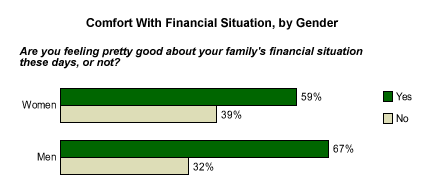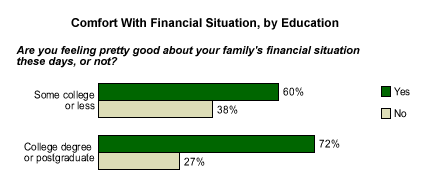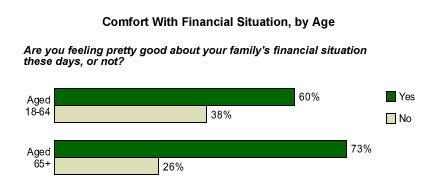Joe and Charity Aldridge of Lincoln, Neb., would be ideal examples for a politician's stump speech. Both in their early 20s, they own their house, have a 2-year-old daughter, and expect another baby next month. Charity is a stay-at-home mom, and Joe works in a factory and is putting himself through college. They work hard, tend their educations, devote themselves to family, and are active in their community. In a way, they personify the American dream.
The Aldridges also personify some demographics people worry about -- a young, four-person, single-income family, no current college degree, and in debt to the bank. But if you ask the Aldridges, they feel that things are OK financially. "We live paycheck to paycheck -- we're always stretched -- but when Joe's out of college and the little ones are in school, we'll be a two-income family, and things will definitely improve," Charity said. "But at this stage, we're pretty comfortable we're not going to ‘lose the farm'." Joe's view is simpler: "I feel pretty good, as good as people usually feel about money."
In that, they personify another celebrated American trait -- personal optimism. When Gallup asked: "Are you feeling pretty good about your family's financial situation these days, or not?" a majority of Americans (63%) say they are feeling good. But Americans with the least financial leverage don't feel quite as good about their financial situations as those who are more economically established.
Feeling Good, on Average
The Aldridges' perspectives on their financial situation seem to mirror the views of other Americans like them.
Charity is a little more concerned than Joe, and according to the data, women are generally a bit less comfortable than men with their family finances. Fifty-nine percent of women say they feel good about them, as do 67% of men.

Joe works full time in a factory and also goes to college, because he knows a degree will pay. And he's right -- 72% of those who have a college degree feel good about their finances, compared to 60% of people without a four-year college degree.

Age also seems to be a factor when it comes to financial comfort. People 65 and older, many of whom have finished their careers and are benefiting from their retirement plans, feel better than their juniors do. Seventy-three percent of those in the oldest age group feel good about their finances, as do 60% of people aged 18 to 64.

The Aldridges expect that when Joe earns his college degree and lands a higher-paying job, they'll feel better about money. And the data do suggest that people with higher incomes, not surprisingly, feel better. Eighty percent of people with household incomes of $50,000 or more say they feel good about their family finances, as do only 52% of people who make less.
Bottom Line
The Horatio Alger theory, which has become part of the American ethos, is that people who work hard, save their money, and stay in school will prosper. The theory has countless exceptions -- but on average, it may have merit. People who have finished college and earn more money do indeed feel better about their finances than others, as do older people who have a lifetime of work supporting them. Joe and Charity, whether they realize it or not, have accepted that ethos -- and odds are good it will serve them well.
*Results are based on telephone interviews with 1,003 national adults, aged 18 and older, conducted June 27-29, 2003. For results based on the total sample of national adults, one can say with 95% confidence that the margin of sampling error is ±3%.
